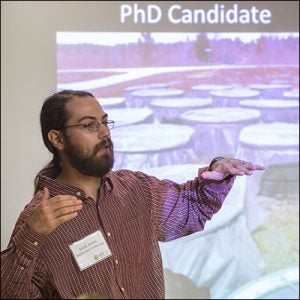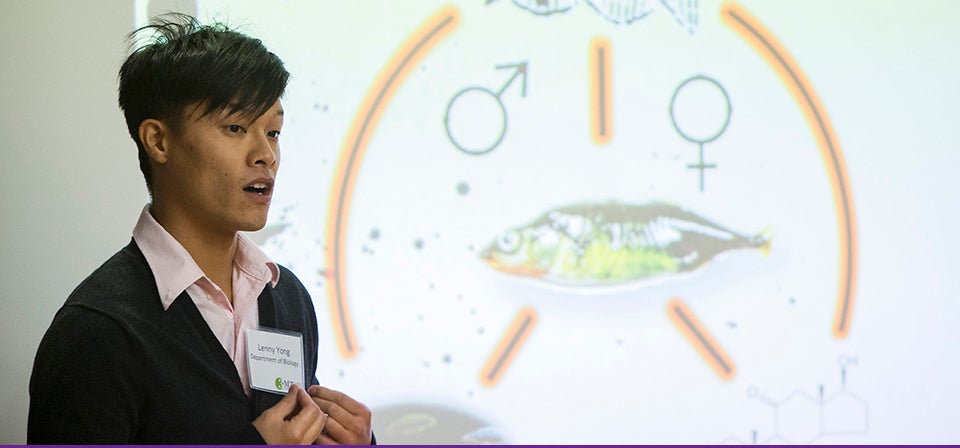THREE MINUTE THESIS
Competition hones communication skills in student researchers
Imagine taking a project you’ve devoted your life to over the last several months, semesters, or even years. You’ve read innumerable pages of academic text and written almost as many yourself, or conducted experiments and tests so frequently you could do them in your sleep.
Now tell a room full of peers, faculty mentors and strangers about your topic and findings in only three minutes. Get them excited! Take longer than that, and you’re disqualified. That is the primary rule of the Three Minute Thesis competition, held Oct. 22 in the Mendenhall Student Center.
It’s the first time East Carolina University has hosted such an event, though universities across the U.S. and around the world have participated in the competition since its inception at the University of Queensland, Australia, in 2008.

ECU student Scott Jones explains his research about tadpoles changing shape to avoid being eaten.
Thirty ECU students participated and more than 100 attended to listen and support their favorite entries. The presentations are judged on comprehension, content, engagement and communication. And the judges ranged from ECU faculty and staff to industry representatives who see a clear benefit to the exercise.
“Being able to communicate thoughts and ideas effectively is invaluable,” said ECU alumnus David Brown, domestic wholesale and export director for Practicon Inc. “(The competition) also trains them to speak to people they may be asking for funding or may be working with to commercialize products.”
Nate Holland, a Department of Physiology student mentored by professor Christopher Wingard, won the ECU event and will go on to compete regionally in New Orleans in March. His research on the link between air pollution and the exacerbation of heart failure also drew accolades for the cleverest title: “Clean up on IL-6.”
Presentation names were only one example of students’ creativity. In the single slide used by pharmacology and toxicology student Eman Soliman, cartoon monsters attacked text message-style emoticons, illustrating how skin cancer kills cells. Katelyn Nall of the Department of Communication Sciences and Disorders posed questions that put listeners in the mindset of someone with Parkinson’s disease.
Competing departments extended beyond the health sciences to include master’s and predoctoral presentations on habitat conservation, history, art and design, and computer science.
“This (competition) isn’t meant to trivialize or dumb down the research, but to crystalize their exploration,” said Carlyle Rogers, head of ECU’s Three Minute Thesis planning committee and fellow in the Office of Technology Transfer.
The Three Minute Thesis competition was sponsored by The Graduate School, ECU’s Office of Postdoctoral Affairs, the Postdoctoral Association and the Office of Technology Transfer. More information about the events and participation worldwide is available online at http://threeminutethesis.org/.
